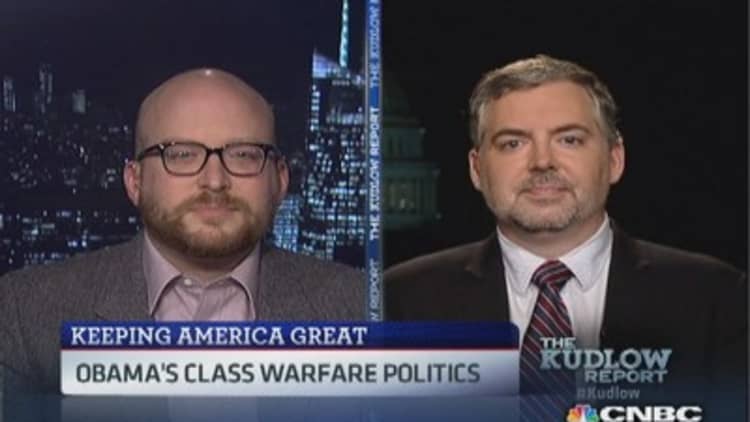With discussion at last week's World Economic Forum in Davos centering on the issue of inequality, echoing President Barack Obama's increased focus on the subject, it seems that the world's rich are starting to take criticism personally—and overreacting in the process.
The latest example is U.S. venture capitalist Thomas Perkins. In a letter to The Wall Street Journal, Perkins said that the "rising tide of hatred of the successful 1 percent" was akin to the persecution of the Jews during Nazi Germany.
Perkins' comments have been met with incredulity and criticism—not least given the timing of his comments: Today is Holocaust Memorial Day.
Regarding the anger directed toward the 1 percent, Perkins wrote: "This is a very dangerous drift in our American thinking. Kristallnacht was unthinkable in 1930; is its descendent 'progressive' radicalism unthinkable now?"
(Read more: Is income inequality biggest global risk?)
Kristallnacht, the "Night of Broken Glass," took place in 1938 when a series of co-ordinated attacks resulted in the destruction of Jewish-owned stores, buildings and synagogues throughout Germany and Austria.
This is not the first time a businessman has compared criticism of the one percent with historical persecution. In September last year, AIG Chief Executive Bob Benmosche said that the anger over banker bonuses "was intended to stir public anger, to get everybody out there with their pitch forks and their hangman nooses, and all that—sort of like what we did in the Deep South."

Andre Spicer, a professor of organizational behaviour at the Cass Business School, City University London, said leaders often rely on extreme emotive analogies when faced with aggressive criticism.
"A good analogy involves a medium amount of stretch between two reference points; a bad analogy involves either too little or too much stretch," he said to CNBC via email. "CEOs comparing public outrage at bankers bonuses to lynching or persecution of Jews is too much stretch."
He continued: "The reason why there is a desperate desire to reach for these analogies is that careful post-mortems of financial crisis have all concluded the way bankers are paid is bad for everyone apart from a small group of elite bankers."
(Read more: Where the 'one percent' live)
Occupy Wall Street lives on
This "analogy overreaction" from Perkins and Benmosche may not help the debate over inequality, bonuses and taxes, but it does reflect a shift in the political and economic discourse in the past few months.
With a consensus emerging that the global economy is becoming more stable, the debate has turned towards rising inequality. More than two years after Occupy Wall Street, which some at the time argued had failed in its goals, some analysts have pointed out that the issues the movement raised are slowly filtering into the political discourse both in the U.S. and around the world.
(Read more: Occupy Wall Street marks second anniversary)
David Remnick, the editor of The New Yorker, said in a podcast last week that Obama, hamstrung over what legislation he can introduce to correct inequality, is looking to "change the conversation and the argument about it, and you will notice, that in the last 'X' months, the discussion about income inequality has gone from Occupy Wall Street to the White House."
Just this weekend, the U.K.'s opposition Labour Party announced plans to reintroduce a 50 percent income tax rate on the top 1 percent of earners if it won the election in 2015. This idea reflects the policies of New York Mayor Bill de Blasio: he proposed a tax for the 1 percent and was a vocal supporter of the Occupy Wall Street campaign.
(Read more: UK business leaders attack 50p tax rate proposal)
As politicians become more fearless in their desire to tax the 1 percent, the financial sector will need to rein in their language so as not to lose the argument completely, Spicer warns.
One example of less emotive arguments came from Sergio Ermotti, chief executive of UBS. During an interview at Davos, Ermotti explained that "life is hard enough, and I think this constant lecturing on ethics and on integrity by many stakeholders is probably the most frustrating part of the equation. Because I don't think there are many people who are perfect."
Spicer concluded that, "Maybe leaders in the financial sector need to focus less on outlandish analogy and more on designing reward and remuneration systems that will create a more sustainable industry."
—By CNBC's Kiran Moodley. Follow him on Twitter @kirancmoodley

